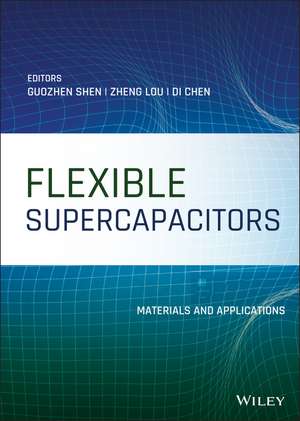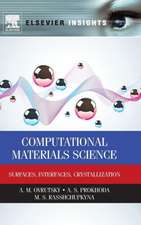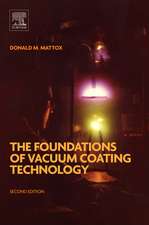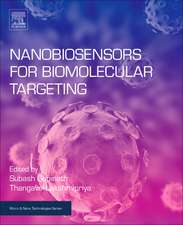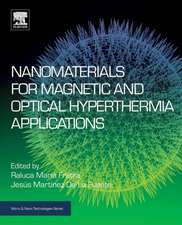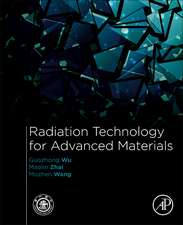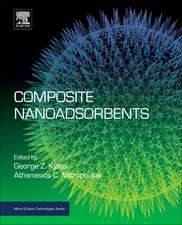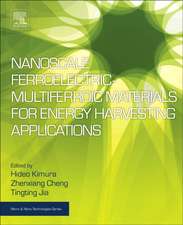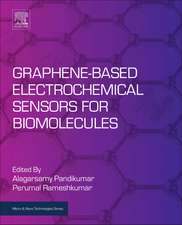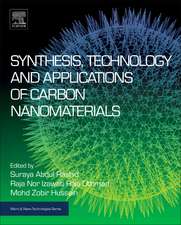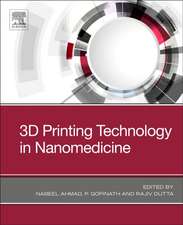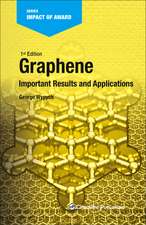Flexible Supercapacitors: Materials and Applicatio ns
Autor G Shenen Limba Engleză Hardback – 14 apr 2022
Preț: 804.37 lei
Nou
153.91€ • 161.13$ • 127.36£
Carte disponibilă
Livrare economică 17-31 martie
Livrare express 28 februarie-06 martie pentru 50.52 lei
Specificații
ISBN-10: 1119506166
Pagini: 336
Dimensiuni: 178 x 254 x 19 mm
Greutate: 0.8 kg
Editura: Wiley
Locul publicării:Hoboken, United States
Notă biografică
Guozhen Shen, PhD, is Professor at the Institute of Semiconductors, Chinese Academy of Sciences, Beijing. His research is focused on flexible and printable electronics. Zheng Lou, PhD, is Assistant Professor at the Institute of Semiconductors, Chinese Academy of Sciences, Beijing. His research focuses on printable and flexible electronics, like transistors, photodetectors, sensors, and energy storage devices. Di Chen, PhD, is Professor at the University of Science and Technology in Beijing. Her research is focused on the design of nanoscale materials for energy applications.
Cuprins
Preface 1 Flexible Asymmetric Supercapacitors: Design, Progress and Challenges Dun Lin, Xiyue Zhang, and Xihong Lu 1.1 Introduction 1.2 Configurations of AFSCs Device 1.3 Progress of Flexible AFSCs 1.3.1 Sandwich-type AFSCs 1.3.2 Fiber-type ASCs 1.4 Summary 2 Stretchable Supercapacitors La Li and Guozhen Shen 2.1 Overview of Stretchable Supercapacitors 2.2 Fabrication of Stretchable Supercapacitors 2.2.1 Structures of Stretchable Fiber-shaped SCs 2.2.2 Planar Stretchable SCs 2.2.3 3D Stretchable SCs 2.3 Multifunctional Supercapacitor 2.3.1 Compressible SCs 2.3.2 Self-healable SCs 2.3.3 Stretchable Integrated System 2.3.4 Perspective 3 Fiber-shaped Supercapacitors Mengmeng Hu, Qingjiang Liu, Yao Liu, Jiaqi Wang, Jie Liu, Panpan Wang, Hua Wang, and Yan Huang Introduction 3.1 Structure of FSSCs 3.2 Electrolyte 3.3 Electrode 3.3.1 Carbon-based Materials 3.3.2 Conducting Polymers 3.3.3 Metal-based Materials 3.3.4 Mxenes 3.3.5 Metal Organic Frameworks (MOFs) 3.3.6 Polyoxometalates (POMs) 3.3.7. Black Phosphorus (BP) 3.4 Electrode Design of FSSCs 3.4.1 Metal-fiber Supported Electrode 3.4.2 Carbon Materials Based Fiber Supported Electrode 3.5 Functionalized FSSCs 3.5.1 Self-healable FSSCs 3.5.2 Stretchable FSSCs 3.5.3 Electrochromic FSSCs 3.5.4 Shape-memory FSSCs 3.5.5 Photodetectable FSSCs 3.6 Conclusion 4 Flexible Fiber-shaped Supercapacitors: Fabrication, Design, and Applications Muhammad S. Javed, Peng Sun, Muhammad Imran, and Wenjie Mai 4.1 Introduction to Fiber-shaped Supercapacitors 4.2 Emerging Techniques for the Fabrication of Fiber-shaped Electrodes 4.2.1 Wet spinning Method 4.2.2 Spray/Cast-coating Method 4.2.3 Hydrothermal Method 4.3 Structures and Design/Configuration of Fiver-shaped Electrodes 4.3.1 Parallel-fiber Electrodes 4.3.2 Twisted-fiber Electrodes 4.3.3 Coaxial-fiber Electrodes 4.3.4 Rolled-fiber Electrodes 4.4 Materials for Fiber-shaped Supercapacitors 4.4.1 Carbon-based Materials for FFSC 4.4.2 Metal Oxides and their Composite-based Materials for FFSC 4.5 Electrolytes for Fiber-shaped Supercapacitors 4.6 Performance evaluation Metrics for Fiber-shaped Supercapacitors 4.7 Applications 4.8 Conclusion and Future Prospectus 5 Flexible Supercapacitors Based on Ternary Metal Oxide (Sulfide, Selenide) Nanostructures Qiufan Wang, Daohong Zhang, and Guozhen Shen 5.1 Introduction 5.1.1 Background of Electrochemical Capacitors 5.1.2 Performance Evaluation of SCs 5.2 Ternary Metal Oxide 5.2.1 1D Ternary Metal Oxide Nanostructural Electrodes 5.2.2 2D Ternary Metal Oxide Nanostructural Electrodes 5.2.3 3D Ternary Oxide Electrodes 5.2.4 Cire-shell Ternary Metal Oxide Composite Electrodes 5.3 Metal Sulfide Electrodes 5.3.1 1D Metal Sulfide Electrodes 5.3.2 2D Metal Sulfide Electrodes 5.3.3 3D Metal Sulfide Electrodes 5.3.4 Metal Sulfide Composite Electrodes 5.4 Metal Selenide Electrodes 5.4.1 1D Metal Selenide Electrodes 5.4.2 2D Metal Selenide Electrodes 5.4.3 3D Metal Selenide Electrodes 5.5 Fiber-shaped SCs 5.6 Summary and Perspectives 6 Transition Metal oxide-based Electrode Materials for Supercapacitors Xiang Wu 6.1 Introduction 6.2 Co3O4 Electrode Materials 6.3 NiO Electrode Materials 6.4 Fe2O3 Electrode Materials 6.5 MnO2 Electrode Materials 6.6 V2O5 Electrode Materials 7 Three-Dimensional Nanoarrays for Flexible Supercapacitors Jing Xu 7.1 Introduction 7.2 Fabrication of 3D Nanoarrays 7.2.1 Selection of substrates 7.2.2 Synthesis Methods of Flexible 3D Nanoarrays 7.3 Typical Structural Engineering of 3D Nanoarrays 7.3.1 Basic 3D Nanoarrays for Flexible Supercapacitors 7.3.2 Hybrid 3D Nanoarrays for Flexible Supercapacitors 7.4 Evaluation of Flexible Supercapacitors 7.4.1 Bending Deformation 7.4.2 Stretching Deformation 7.4.3 Twisting Deformation 7.5 Conclusion 8 Metal Oxides Nanoarray Electrodes for Flexible Supercapacitors Ting Meng and Cao Guan 8.1 Introduction 8.2 Synthesis Techniques of Metal Oxide Nanoarrays 8.2.1 Solution-based Route 8.2.2 Electrodeposition Growth 8.2.3 Chemical Vapor Deposition 8.3 The Flexible Support Substrate for Loading Nanoarrays 8.3.1 3D Porous Graphene Foam 8.3.2 Carbon Cloth Current Collectors 8.3.3 Metal Conductive Substrates 8.4 The Geometry of Nanostructured Arrays 8.4.1 The 1D Nanostructured Arrays 8.4.2 The 2D Nanostructured Arrays 8.4.3 The Integration of 1D@2D Nanoarrays 8.5 Conclusions and Prospects 9 Printed Flexible Supercapacitors Yizhou Zhang and Wen-Yong Lai 9.1 Overview of Printed Flexible Supercapacitor 9.2 Devices Structure of Printed SCs 9.3 Printable Materials for SCs 9.3.1 Carbon-based Materials 9.3.2 Electrolytes 9.3.3 Flexible substrates 9.4 Fabrication of Flexible SCs Using Various Printing Methods 9.4.1 Inkjet Printing 9.4.2 Screen Printing 9.4.3 Transfer Printing 9.4.4 3D Printing 9.5 Printed Integrated System 9.6 Perspective 10 Printing Flexible On-chip Micro-Supercapacitors Guozhen Shen 10.1 Introduction 10.2 Printable Materials for On-chip MSCs 10.2.1 Printable Electrode Materials 10.2.2 Printable Current Collector 10.2.3 Printable Electrolyte 10.3 Printing Techniques 10.3.1 Inkjet Printing 10.3.2 Spray Printing 10.3.3 Screen Printing 10.4 Summary 11 Recent advances of flexible micro-supercapacitors Zhiqiang Niu 11.1 Introduction 11.2 General Features of Flexible MSCs 11.3 Active Materials of Flexible MSCs 11.3.1 Graphene-based Materials 11.3.2 CNT-based Materials 11.3.3 Other Carbon-based Materials 11.3.4 Transition Metal Oxides and Hydroxides 11.3.5 MXenes 11.3.6 Conductive Polymer 11.4 Integration of Flexible MSCs 11.4.1 Flexible Self-charging MSCs 11.4.2 Flexible Self-powering MSCs 11.5 Flexible Smart MSCs 11.5.1 Flexible Self-healing MSCs 11.5.2 Flexible Electrochromic MSCs 11.5.3 Flexible Photodetectable MSCs 11.5.4 Flexible Thermoreversible Self-protecting MSCs 11.6 Summary and Prospects
Descriere
Comprehensive coverage of the latest advancements in flexible supercapacitors In Flexible Supercapacitors: Fundamentals and Applications, a team of distinguished researchers delivers a comprehensive and insightful exploration of the foundational principles and real-world applications of flexible supercapacitors. This edited volume includes contributions from leading scientists working in the field of flexible supercapacitors. The book systematically summarizes the most recent research in the area, and covers fundamental concepts of electrode materials and devices, including on-chip microsupercapacitors and fiber supercapacitors. The latest progress and advancements in stretchable supercapacitors and healable supercapacitors are also discussed, as are problems and challenges commonly encountered in the development of flexible supercapacitors. The book concludes with suggestions and fresh perspectives on future research in this rapidly developing field. Flexible Supercapacitors: Fundamentals and Applications also offers: * A thorough introduction to the fundamentals of supercapacitors, including their materials and devices * Comprehensive explorations of flexible fiber supercapacitors and two-dimensional materials for flexible supercapacitors * In-depth examinations of flexible supercapacitors with metal oxides-based electrodes and flexible on-chip microsupercapacitors * Practical discussions of stretchable and healable supercapacitors, as well as patterned nanostructured electrodes Perfect for researchers in the fields of materials science, physics, and electrical engineering, Flexible Supercapacitors: Fundamentals and Applications is also an ideal reference for developers interested in supercapacitor design, materials, and devices.
